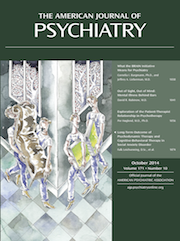Effects of Post-Session Administration of Methylene Blue on Fear Extinction and Contextual Memory in Adults With Claustrophobia
Abstract
Objective
Preclinical studies have shown that low-dose methylene blue increases mitochondrial cytochrome oxidase activity in the brain and improves memory retention after learning tasks, including fear extinction. The authors report on the first controlled experiment to examine the memory-enhancing effects of posttraining methylene blue administration on retention of fear extinction and contextual memory following fear extinction training.
Method
Adult participants displaying marked claustrophobic fear were randomly assigned to double-blind administration of 260 mg of methylene blue (N=23) or administration of placebo (N=19) immediately following six 5-minute extinction trials in an enclosed chamber. Retesting occurred 1 month later to assess fear renewal as indexed by peak fear during exposure to a nontraining chamber, with the prediction that the effects of methylene blue would vary as a function of fear reduction achieved during extinction training. Incidental contextual memory was assessed 1 and 30 days after training to assess the cognitive-enhancing effects of methylene blue independent of its effects on fear attenuation.
Results
Consistent with predictions, participants displaying low end fear posttraining showed significantly less fear at the 1-month follow-up if they received methylene blue posttraining compared with placebo. In contrast, participants displaying moderate to high levels of posttraining fear tended to fare worse at the follow-up if they received methylene blue posttraining. Methylene blue’s enhancement of contextual memory was unrelated to initial or posttraining claustrophobic fear.
Conclusions
Methylene blue enhances memory and the retention of fear extinction when administered after a successful exposure session but may have a deleterious effect on extinction when administered after an unsuccessful exposure session.



